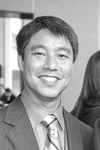
David Inoue
We once again celebrate the accomplishments of some of JACL’s top graduating high school and continuing college, graduate and professional students. JACL’s scholarship program helps to defray what is becoming a prohibitively expensive venture for any student to attend institutions of higher learning.
For many of us who read the Pacific Citizen, we attended college years ago when four years of undergraduate studies may have been expensive, but with financial aid, was manageable. I was fortunate to leave undergraduate studies with a little over $10,000 in student loans, despite attending a college that at the time cost in excess of $25,000 annually with cost of living included. Today, tuition at that same school alone is $60,000, close to $80,000 when room, board, books and other expenses are added.
Not every school is that expensive, yet the debt burden on students and their families is escalating to debilitating levels. I now hear of students graduating from four-year programs such as I did with their families carrying total debt loads of close to $200,000. Unless one is going to work for a tech company or in investment banking, the prospect of paying back that much debt is unimaginable.
These are outliers, but effective for their shock value. The majority of loan debt in the six figures is incurred by graduate and professional students, who if they complete their degrees and secure a job in their field, should have little problem paying back that debt.
The challenge is most acutely felt for the average student who takes on the average debt load, which is around $36,000 now. This average student typically comes from what is still considered a middle-class family earning around $60,000 annually, though in many urban areas, is in reality slipping from what might truly be considered middle class. Yet for students in this position, they are likely to be unable to attend without the assistance of student and family loans.
The result is that we are placing the most vulnerable students at greater risk and under greater stress. The increasing debt is inevitable to impact decisions about what classes to take and major to pursue with a thought to how they might repay the growing loans. College is no longer about education but about finding a job and maximizing income, something for which college should not be necessary.
The reality is that most people rarely use the actual subject matter learned during their undergraduate years. I certainly never do any chemistry work in my daily work.
I actually bristle if someone randomly approaches JACL for Japanese to English translations, despite my passable speaking ability.
And yet, college increasingly is focused on teaching only courses in the science, technology, engineering and math (STEM) fields, while liberal arts classes are increasingly devalued and, in some cases, even eliminated.
A recent study found an inverse correlation between increasing belief in factually incorrect conspiracy theories and decreasing ability to think critically. These are the skills we lose when we singularly focus on a few limited aspects of higher learning.
Engineers also need to comprehend reading of classical literature and engage in critical discussion of the merits, or even now, the negative characteristics of such pieces.
There is much that needs to be reformed at the upper echelons of our academic system. College needs to be affordable for all and not limited to those whose families can afford it. Eliminating this financial pressure will also allow all students the freedom to study from a diverse educational palette. College must not be simply a means to get a job to pay back student loans.
For those who know they want to go into a technical field, they absolutely should pursue an engineering or science degree but should also be encouraged in the pursuit of elective studies in the liberal arts.
For those not interested or inclined to pursue a STEM career, use the freedom of college to explore a variety of coursework. To students entering their first year of college this year, I would urge you to follow the motto of my own alma mater that “any person [can] find instruction in any study.”
David Inoue is executive director of the JACL. He is based in the organization’s Washington, D.C., office.



